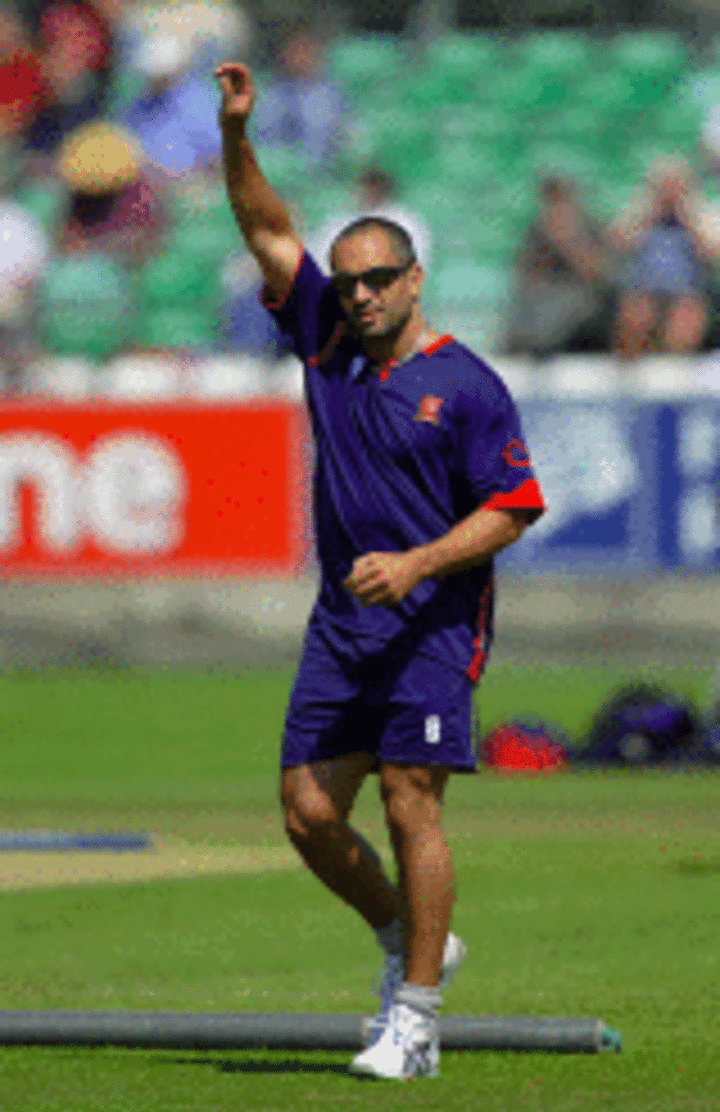The man who should have been king
Adam Hollioake led a star-deprived, profoundly maverick but one-for-all XI to victory in the 1997-98 Champions Trophy, the only one-day pot England have won in a tournament featuring more than three sides

This has already been quite a year for comebacks involving my favourite entertainers, what with The Police, Steely Dan and Squeeze all accepting sizeable sums to return to concert stages. I sincerely doubt he is in it for the money – he appears to be doing fairly nicely thank-you in the property game in his native Perth – but another is scheduled to return to the boards on Friday when Adam Hollioake makes his debut for Essex in the Twenty20 Cup. An ex-Surrey captain turning out for that Chelmsford lot? It’ll take some getting used to.
The upshot of a spot of beach cricket with Graham Gooch on the Gold Coast in January, Hollioake’s return to arms prompts the odd wild imagining. Since he was arguably the first player to master the super-abbreviated game – Surrey’s first defeat came in their 14th match, the 2004 final, and he was the leading wicket-taker in each of the first two seasons – might it be that Gooch was acting under ECB instructions? Even in semi-retirement, Hollioake is still the best man to captain England in the inaugural Twenty20 World Cup.
At Surrey, he succeeded where Stuart Surridge’s successors had repeatedly and miserably stumbled, presiding over a gift-laden dressing room yet subsuming egos to the point where trophies flowed whatever the format. Strong-minded yet flexible, tactically sharp and a decent psychologist, it was entirely typical that the one time I know I offended him was with praise and admiration.
In 2002, his brother Ben died, a loss he still feels keenly and the reason his appetite for the game drained. During the ensuing county campaign, he played a match winning knock and, according to one colleague, told his charges that he had done it “for Ben”. I duly mentioned this in the Sunday Telegraph only to be upbraided by my source: Adam saw it as an invasion of privacy.
He led a star-deprived, profoundly maverick but one-for-all XI to victory in the 1997-98 Champions Trophy, the only one-day pot England have won in a tournament featuring more than three sides. He should have led them at the 1999 World Cup, and probably the next one too. He would certainly have been worth his place as a player. A feisty and creative batsman, he was also a prolific wobbler of the seam and arguably the first bowler to draw inspiration from baseball’s knuckleballers and change-up artists.
There are a few reasons a fully-qualified conspiracy theorist such as myself might cite for the decision to persistently overlook him. For starters, one suspects he was a tad too in-your-face, a wee bit too Australian, the latter of which took quite some doing given the prevailing lust for all things formerly baggy and green of cap.
During their years of dominance, Surrey, moreover, were detested by all but the Kennington regulars (Englishmen always were rather good at disguising envy as contempt). Nor did it help that Nasser Hussain, a man of Essex, was his rival-in-chief. When Hollioake was summoned to the 2002-03 Australian tour, many observers reckoned that Hussain felt threatened by his presence, a suspicion borne out by his ensuing paucity of playing time.
Is it too late to correct this rank oversight? I don’t see why. After all, this is a bloke who recently lost 11kg in order to box Eric Rush, New Zealand’s former junior light-heavyweight champ and renowned All Black wing, a sacrifice for charity that only saw him lose on a split decision. Raising a family, and funds for the Ben Hollioake Foundation, may be his primary goals these days, but if the selectors are looking for a scrapper with nifty footwork, a strong jab and a meaty right hook, they could do a good deal worse.
Rob Steen is a sportswriter and senior lecturer in sports journalism at the University of Brighton
Read in App
Elevate your reading experience on ESPNcricinfo App.